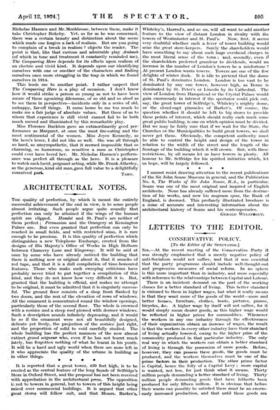It is reported that a great tower, 450 feet high,
is to be erected as the central feature of the long facade of Selfridge% . Store in Oxford Street, and the proposal has not been received with approbation in the architectural press. The opposition is not to towers in ,general, but to towers of this height 'being raised over commercial buildings. It is argued that other great stores will follow suit, and that Messrs. Barker's,
Whiteley's, Harrod's, and so on, will all want to add another feature to the view of distant London in rivalry with the towers of Westminster and St. Paul's. Now, first, it seems very doubtful whether such a fever of tower building would seize the great store-keepers. Surely the shareholders would have something to say about such huge overhead charges in the most literal sense of the term ; and, secondly, even if the shareholders preferred grandeur to dividends, would an increase in the number of London's towers be a misfortune ? At present London wants towers. Towers are one of the few delights of winter dusk. It is idle to pretend that the dome of St. Paul's dominates London. London is too vast to be dominated by any one tower, however high, as Rome is dominated by St. Peter's or Lincoln by its Cathedral. The view of London from Hampstead or the Crystal Palace would gain enormously in interest if the spectator could pick out, say, the great tower of Selfridge's, Whiteley's mighty dome, or the cloud-capt pinnacles of Barker's. Of course, the question whether it should be left. to big stores to provide these points of interest, which should really each mark some great public building, is one on which opinion must be divided. But we may be fairly sure that if we wait for the State, the Churches or the Municipalities to build great towers, we shall never get them. Obviously, the competent authority must be able to control the height and design of the tower in relation to the width of the street and the length of the frontage of the building which it will crown. But, with these restrictions, by all means let us have towers in plenty. All honour to Mr. Selfridge for his spirited initiative which, let us hope, will be largely followed.










































 Previous page
Previous page